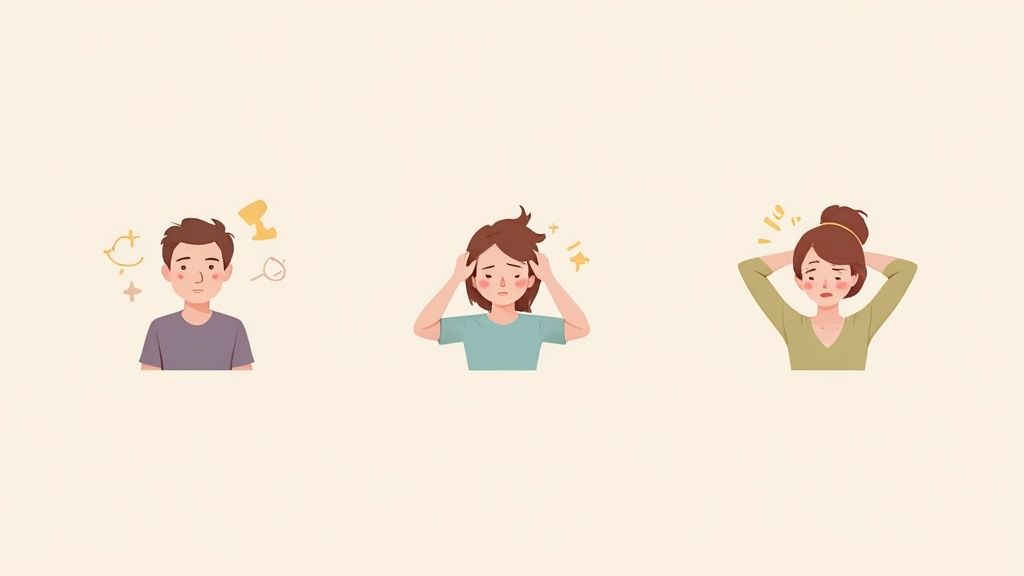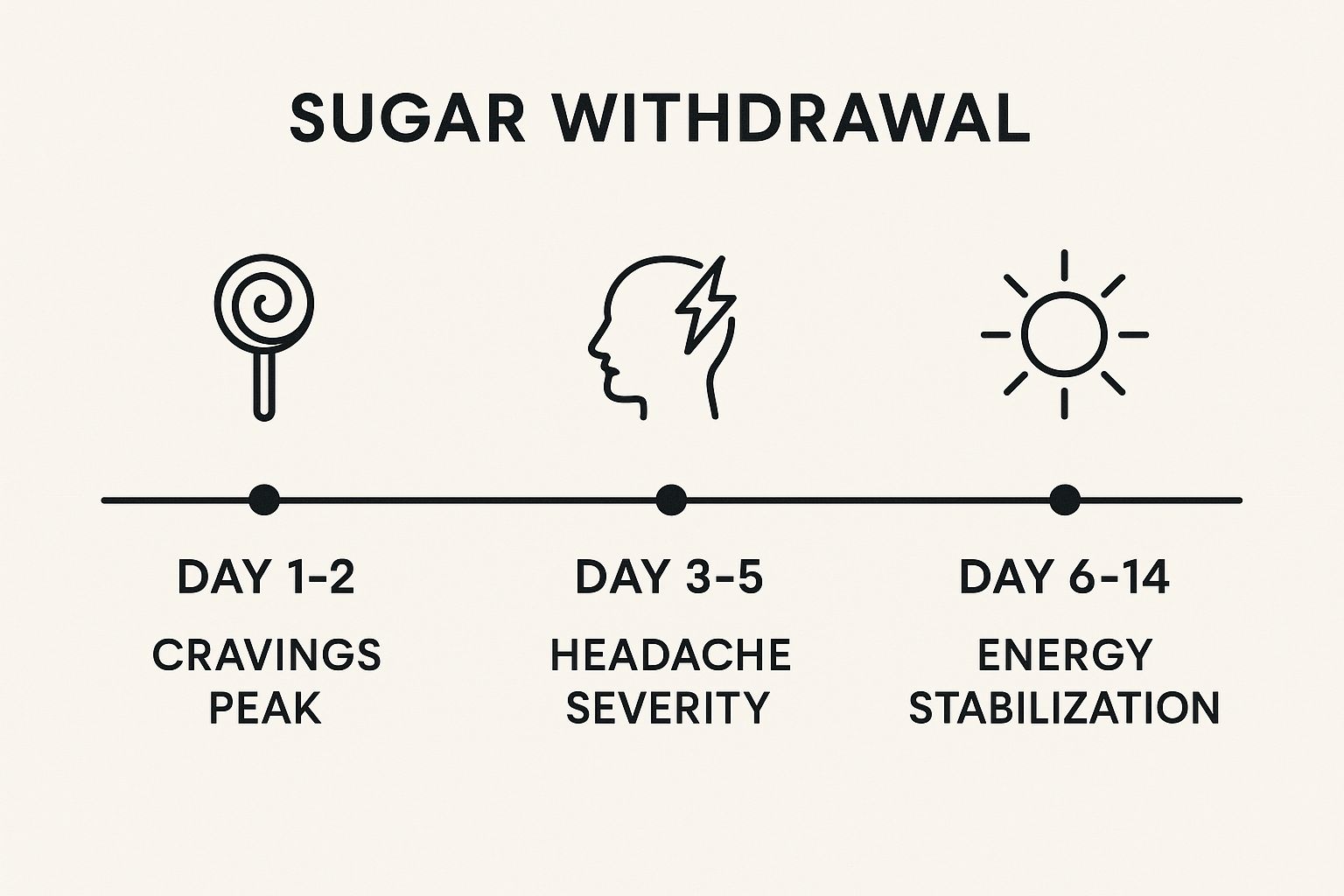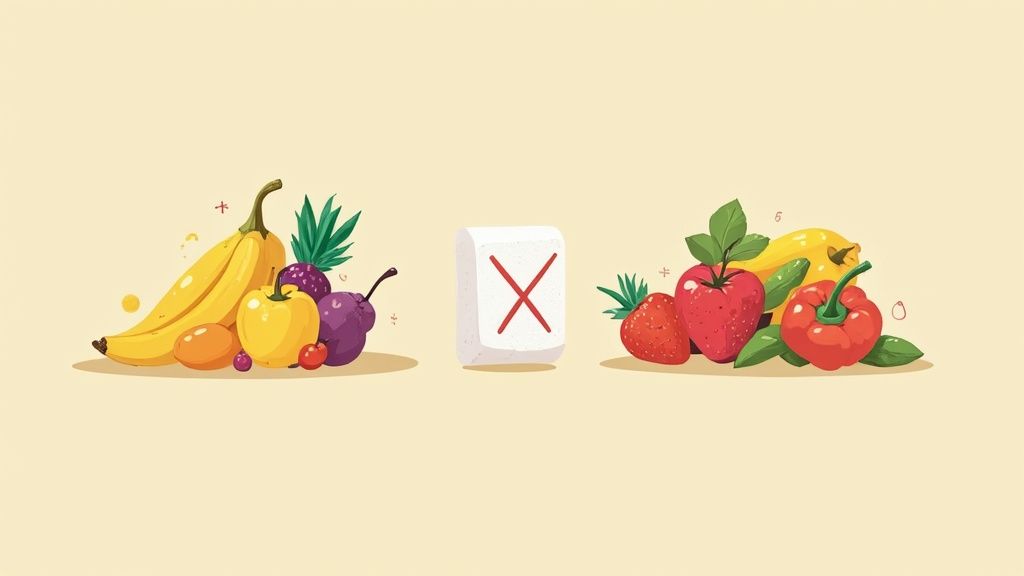What Are Symptoms of Sugar Withdrawal (A Clear Guide)

When you decide to ditch sugar, your body might not be too happy about it at first. The symptoms you feel are a mix of physical and mental hurdles, ranging from intense cravings and headaches to irritability and brain fog.
Your Guide to Sugar Withdrawal Symptoms
Giving up sugar is a huge win for your long-term health, but the initial break-up can be rough. Think of it this way: your body has gotten used to running on a quick, cheap fuel source. When you suddenly take it away, it has to learn how to use a more efficient, long-lasting energy supply. That adjustment period is what we call withdrawal.
These symptoms are completely normal and, thankfully, temporary. They're simply signs that your body and brain are recalibrating and healing from the constant roller coaster of sugar highs and crashes.
What to Expect: Physical and Psychological Signs
Sugar withdrawal isn't just in your head—it's a full-body experience. How intense it feels often depends on how much sugar was in your diet to begin with. Some people feel a little off for a few days, while others feel like they have a full-blown flu.
Physically, you might be dealing with nagging headaches, fatigue, and even an upset stomach. Mentally, it's common to feel moody, anxious, sad, or have a tough time concentrating. If you're curious about the science behind it, you can discover more about how sugar withdrawal affects the mind and body on ChoosingTherapy.com.
Quitting sugar forces your body to find new, more stable energy pathways. The initial discomfort you feel is the physical and neurological transition away from easy, fast-burning glucose to more sustainable fuel sources.
To get a better handle on what you might go through, it helps to see the symptoms laid out. This overview of sugar withdrawal symptoms can help you know what's coming so you can face it head-on.
Common Sugar Withdrawal Symptoms at a Glance
Here’s a quick summary of what many people experience when they stop eating sugar.
| Symptom Category | Common Symptoms |
|---|---|
| Physical Symptoms | • Intense sugar or carb cravings• Headaches or migraines• Fatigue and low energy levels• Nausea or upset stomach• Muscle aches and pains |
| Psychological Symptoms | • Irritability and mood swings• Anxiety or feeling on edge• Brain fog and difficulty focusing• Depressed mood or sadness |
Seeing these listed out can help you recognize what's happening and remind you that it's all part of the process of your body getting healthier.
Why Your Body Is Reacting This Way

Ever wondered why giving up sugar feels so awful? It's not just in your head—it’s a real, physical process happening inside your brain. The culprit is a powerful little chemical called dopamine.
When you eat something sweet, your brain’s reward system releases a flood of dopamine, making you feel pleasure and satisfaction. It’s the same feel-good response you get from a good laugh or listening to a favorite song. But when you eat sugar regularly, your brain gets used to that constant hit and starts to expect it.
Think of it like a well-traveled highway. Your brain builds a fast lane straight to that dopamine reward. When you suddenly cut out sugar, you’re essentially shutting down that highway. The result is a neurological traffic jam, leading to those intense cravings and crummy moods.
The Neurochemical Shift Explained
This isn't just a feeling; it's a measurable chemical event. Studies show that when you stop eating sugar, dopamine levels in key parts of the brain take a nosedive. At the same time, levels of another neurotransmitter, acetylcholine, begin to rise. This chemical imbalance is strikingly similar to what happens during withdrawal from other addictive substances.
You can learn more about the neurological findings that tie these chemical changes directly to the tough symptoms you feel. This brain-level disruption is why the symptoms of sugar withdrawal can be so intense, messing with everything from your energy to your focus.
It's crucial to understand this isn't a failure of willpower. The brain fog, headaches, and irritability are predictable, physiological responses. Your brain is literally rewiring itself to function without the constant sugar rush.
Seeing it this way can help you be kinder to yourself through the process. Your body isn't fighting you; it's healing. That discomfort you feel is actually a sign that your system is recalibrating for a healthier, more stable state.
Your Sugar Withdrawal Timeline
Knowing what to expect can make the whole idea of quitting sugar feel a lot less intimidating. While everyone's body is different, the symptoms you'll feel when you cut out sugar tend to follow a pretty predictable pattern. Think of it as a roadmap for your body's big adjustment.
This timeline isn’t set in stone, but it’s a solid guide to what you might experience, both physically and mentally, as your system gets back in balance. Seeing the phases laid out can give you a sense of control and remind you that the rough parts won't last forever.
This visual breaks down when the most common symptoms usually hit their peak.

As you can see, the toughest physical hurdles usually pop up right at the beginning. After that, things start to even out as your body finds its new normal.
To give you a clearer picture, this table breaks down what you might feel day-by-day.
Sugar Withdrawal Timeline: An Overview
| Timeframe | Expected Physical Symptoms | Expected Psychological Symptoms |
|---|---|---|
| Days 1-2 | Peak Intensity. Headaches, fatigue, strong cravings for sugar and carbs, muscle aches. | High Intensity. Irritability, brain fog, feeling anxious or down. |
| Days 3-5 | Moderate. Headaches and fatigue begin to fade. Cravings are still present but may be less constant. | Peak Intensity. This is often the toughest part for mood swings and general crankiness. |
| Week 1 | Mild. Most physical symptoms have subsided. You might notice more stable energy levels. | Moderate. Brain fog starts to lift. Cravings become more manageable, appearing in waves. |
| Week 2 & Beyond | Minimal to None. Energy improves significantly. Sleep patterns may become more regular. | Mild to None. Mood stabilizes. You'll likely feel clearer and more focused. |
This overview gives you a general idea, but remember to listen to your body and be patient with the process.
The First 48 Hours
Let’s be honest: the first two days are usually the toughest. This is when your body is practically shouting for its usual quick-energy fix, and the physical symptoms can be intense.
- Intense Cravings: You can expect some seriously powerful urges for anything sweet or starchy. Your brain is missing the dopamine rush it’s used to getting from sugar.
- Headaches: Throbbing headaches are a classic sign as your body deals with changes in blood sugar and brain chemistry.
- Fatigue: Feeling wiped out is completely normal. Your system is learning to burn more stable fuel sources instead of just running on sugar.
During this initial shock, focus on drinking plenty of water and getting as much rest as you can. Your body is working hard behind the scenes, and giving it that support makes a huge difference.
Days Three to Five
This is often the turning point. While you might still have a lingering headache, the physical symptoms usually start to back off. The catch? This is when the psychological side of withdrawal can really ramp up.
You might find yourself feeling irritable, moody, or anxious. It’s because your brain's reward system is still recalibrating, which can leave you feeling emotionally all over the place.
Now is the time to be kind to yourself. These feelings are a totally normal part of the process, not a sign that you're failing.
The First Two Weeks and Beyond
Once you've cleared that first week, most of the really tough physical stuff should be behind you. You’ll probably start noticing your energy is much more stable—no more of those classic afternoon slumps.
Cravings might still pop up now and then, but they'll be far less demanding and show up less often. Your focus will start to sharpen, and that persistent brain fog will finally begin to clear. It’s a huge step toward feeling like yourself again.
How to Manage Physical Withdrawal Symptoms

Let's be honest—the physical side of quitting sugar can be tough. The headaches, the exhaustion, and those relentless cravings are very real. It's your body reacting to the sudden absence of its usual quick-energy source.
Think of it this way: your body is sending out an S.O.S. It’s asking for help while it adjusts to a new normal. If you give it the right support, you can make this transition a whole lot smoother.
Your Toolkit For Physical Relief
You don’t have to just white-knuckle your way through the physical symptoms. There are simple, effective things you can do right now to feel better and help your body find its balance.
Here are a few go-to strategies to have in your back pocket:
- Fight Headaches with Hydration: A pounding headache is one of the first things many people notice, and dehydration often makes it ten times worse. Keep water handy all day long. A little trick is to add a tiny pinch of mineral-rich salt to your water to help with your electrolytes.
- Combat Fatigue with Protein: When you're feeling completely wiped out, the temptation to grab carbs for a quick fix is strong. Instead, reach for protein and healthy fats. A handful of nuts, a hard-boiled egg, or a few slices of avocado will give you steady, lasting energy, not a temporary spike followed by a crash.
- Manage Cravings with Fiber: Cravings are often your body’s cry for stable blood sugar. Foods high in fiber—think veggies, berries, and beans—digest slowly, which helps keep things level. This can quiet down those screaming demands for something sweet. For a deeper dive, check out our guide to https://stopsugar.app/blog/sugar-detox-side-effects.
Don't underestimate the power of rest. Your body is working overtime to repair and recalibrate itself. Getting extra sleep isn't lazy; it's a critical part of the healing process.
If you’re looking for more ways to support your body's natural cleansing efforts, this resource on how to detox naturally has some great tips. A few smart moves can make all the difference, turning a difficult journey into a manageable one.
Navigating the Emotional Rollercoaster
As tough as the physical symptoms of sugar withdrawal are, the mental and emotional side can feel even harder to handle. If you're feeling irritable, anxious, or just plain foggy, that’s not a sign you're failing. It’s your brain chemistry doing the hard work of rebalancing itself.

For a long time, your brain has counted on sugar for a quick hit of dopamine, the chemical that makes you feel good. When you suddenly take that away, your dopamine levels can dip, leading to mood swings and that general feeling of being "off." Think of it as your brain learning to operate on a new, more stable baseline without the constant artificial highs.
Proactive Coping Strategies
Instead of just white-knuckling it and waiting for the storm to pass, you can take some simple, proactive steps to manage these emotional waves. The goal is to support your brain and body through this big change. It can also be really helpful to understand [https://stopsugar.app/blog/why-do-i-crave-sugar] in the first place, as it gives you insight into why you're feeling this way.
Here are a few tools you can put to use right away:
- Mindful Movement: You don't need to run a marathon. Just a simple 10-minute walk outside can give you a natural mood boost and help clear out some of that brain fog.
- Journal Your Frustrations: When irritability hits hard, grabbing a pen and writing it all down can be an amazing release. It helps you process the emotion without taking it out on yourself or others.
- Practice Self-Compassion: Be kind to yourself. This is a temporary—and totally normal—part of the healing process. You wouldn't get mad at your muscles for being sore after a tough workout, so give your brain that same grace.
Be patient with yourself. Your emotional state is directly tied to the physiological changes happening in your body. This discomfort is a sign of progress, not a setback.
Anxiety can be a particularly strong guest during this phase. As you navigate these emotional hurdles, you might find it helpful to explore some natural strategies to reduce anxiety for extra support. These tools can give you the confidence to manage whatever comes your way.
Got Questions About Kicking Sugar?
Deciding to cut back on sugar is a big step, and it's totally normal to have a bunch of questions swirling around. Knowing what's coming can make the whole process feel less intimidating and give you the confidence you need to see it through. Let's tackle some of the most common worries people have when they start this journey.
Think of this as your practical guide to navigating the bumps in the road.
How Long Does This Last? The Sugar Withdrawal Timeline
So, how long are you going to feel... well, off? The truth is, it's a bit different for everyone. That said, the toughest physical symptoms—think pounding headaches and dragging fatigue—usually hit their peak in the first two to five days. After about a week, you should start to feel a whole lot better on that front.
The mental side of things, like feeling cranky or dealing with those relentless cravings, can stick around for a few more weeks. It really depends on how much sugar you were eating before and your overall health. The key is to be patient with your body as it adjusts.
Is There Any Way to Skip the Withdrawal Symptoms?
I wish I could say yes, but completely dodging all the symptoms is pretty unlikely, especially if you had a serious sweet tooth. The good news? You can absolutely make it a much smoother ride. Instead of quitting cold turkey, try tapering off your sugar intake over a week or two. It's a much gentler way to ease your body into the change.
A few simple habits can also take the edge off:
- Drink More Water: Seriously. Staying hydrated is a game-changer for keeping withdrawal headaches at bay.
- Eat Real Meals: Focus on getting enough protein and fiber. This keeps your blood sugar from going on a rollercoaster ride.
- Get Your Sleep: Your body is working hard to adjust. Giving it plenty of rest is non-negotiable.
- Move a Little: Even a quick walk can do wonders for your mood and energy levels when you're feeling sluggish.
These small things really do add up and can make a massive difference in how you feel.
What Can I Eat When a Crazy Sugar Craving Hits?
When a craving strikes, your best defense is a good offense. The goal is to eat whole foods that give you slow, steady energy. This prevents the blood sugar crashes that make you desperate for a quick, sugary fix.
Try reaching for snacks that are packed with protein, healthy fats, and fiber. Some of my go-to's are:
- A handful of almonds or walnuts
- Apple slices with a scoop of natural peanut butter
- Plain Greek yogurt topped with a few berries
- A simple hard-boiled egg
These options will actually fill you up and keep you feeling stable, making it so much easier to tell those cravings to take a hike.
Think of it this way: you're retraining your body. You want to give it the kind of high-quality fuel that keeps it running smoothly, so it stops sending out emergency signals for cheap, fast energy from sugar.
Is It Normal to Feel This Exhausted?
Oh, absolutely. Feeling like you could fall asleep at your desk is one of the most common symptoms of a sugar detox. For a long time, your body has been running on the cheap, easy energy it gets from sugar. When you suddenly take that away, it has to learn how to tap into better fuel sources, like fat and protein.
This "recalibration" phase can leave you feeling completely wiped out for a few days. It’s temporary, I promise. For now, make rest a priority, keep chugging that water, and stick with nutrient-rich foods. Your energy will bounce back, and it will be a much cleaner, more stable energy than you had before.